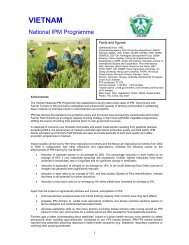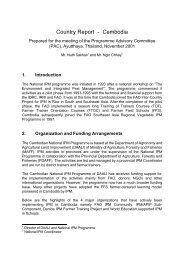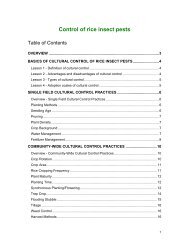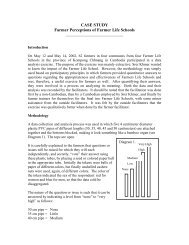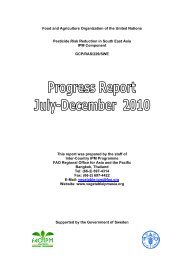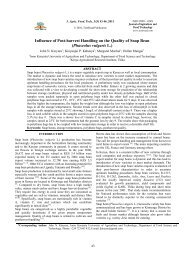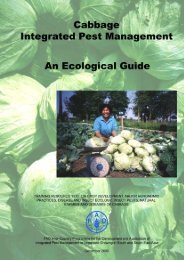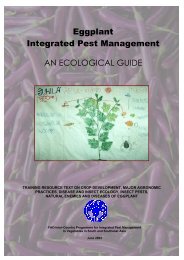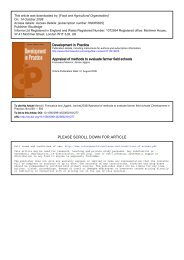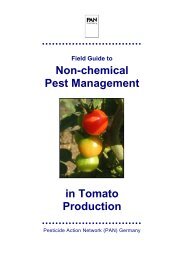All about potatoes.pdf - Vegetableipmasia.org
All about potatoes.pdf - Vegetableipmasia.org
All about potatoes.pdf - Vegetableipmasia.org
Create successful ePaper yourself
Turn your PDF publications into a flip-book with our unique Google optimized e-Paper software.
3.<br />
SOIL<br />
field to field and at different times of year, however, testing is not necessary every<br />
season.<br />
3.2.4 Organic fertilizers<br />
A. The role of <strong>org</strong>anic matter<br />
Organic matter consists of the substances originating from plant remnants and<br />
animal remains and contains nutrients beneficial to soil health. The need for <strong>org</strong>anic<br />
matter is unlimited, the more added to the soil, the better the soil will become.<br />
Organic matter functions to:<br />
• Increase soil friability - Organic matter will balance soil forming components<br />
making soil crumble easily. Friable soil is important for supporting tuber growth.<br />
• Increase soil fertility - Organic matter contains and gradually provides many macro<br />
and micro nutrients.<br />
• Increase beneficial <strong>org</strong>anisms in the soil, such as decomposers of plant remnants.<br />
• Positively influence soil temperature and moisture levels.<br />
B. Compost<br />
Compost results from the decomposition of various forms of <strong>org</strong>anic matter. It plays<br />
an essential role in enriching nutrient content in the surface layer of the soil. Finished<br />
compost contains an abundance of nutrients.<br />
The benefits of using compost are:<br />
• Compost contains readily available nutrients for plants. In the composting process<br />
raw <strong>org</strong>anic matter decomposes and becomes ready for plants as nutrients to<br />
absorb.<br />
• Compost contains a balanced composition of both micro and macro nutrients.<br />
• Compost is made from materials that are readily available in the farm<br />
environment, such as plant remnants and/or animal feces.<br />
• Compost facilitates good soil structure. High levels of <strong>org</strong>anic matter in the soil<br />
can improve its capacity to hold water and increases soil friability thus simplifying<br />
tillage.<br />
• Compost increases the diversity and quantity of beneficial living <strong>org</strong>anisms in the<br />
soil and suppresses the development of damaging living <strong>org</strong>anisms.<br />
Disadvantages of using compost:<br />
• Required in large quantities to supply the required amount of nutrients. Optimal<br />
use of <strong>org</strong>anic fertilizer for potato crops is 20 tons/ha.<br />
• Labor intensive, both in its production and application.<br />
• Compost takes a long time to make: 1-4 months.<br />
• Unfinished compost may still contain pests and diseases that are dangerous to the<br />
potato crop.<br />
There are various ways to make compost and different farmers use different<br />
methods. However, the general principles of making compost are as follows:<br />
• Collect raw materials for compost (plant material and/or animal feces). Compost<br />
made from a combination of greenery and dung has a better composition than<br />
compost made from only one of the two. <strong>All</strong> greenery, including weeds, can be<br />
used as raw material for compost.<br />
• Sort the raw materials. This stage is done to remove pollutants such as plastic, tin<br />
cans etc. that will not decompose, and plants infected with diseases (rotten potato<br />
tubers, diseased potato plants etc.)<br />
10<br />
ALL ABOUT POTATOES



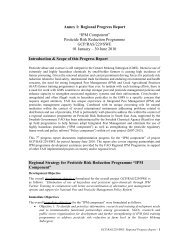
![Section 4 [ PDF file, 252 KB] - The Field Alliance](https://img.yumpu.com/51387260/1/158x260/section-4-pdf-file-252-kb-the-field-alliance.jpg?quality=85)
